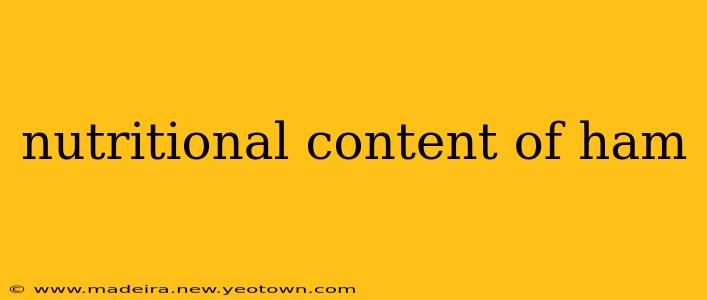Ham. The very word conjures images of holiday feasts, elegant charcuterie boards, and satisfying sandwiches. But beyond its delectable taste and versatility, what's the nutritional story behind this popular cured meat? Let's delve into the details, uncovering the nutritional content of ham and addressing some common questions.
This isn't just a simple nutritional breakdown; it's a journey through the factors influencing ham's nutritional profile, from the type of ham to preparation methods. We'll uncover the truth behind the sometimes-conflicting information you might find online.
What are the main nutrients found in ham?
Ham is primarily a source of protein, providing essential amino acids our bodies need for building and repairing tissues. It also contains varying amounts of fat, sodium, and vitamin B1 (thiamin). However, the exact amounts vary significantly depending on the type of ham (e.g., honey-glazed, smoked, canned), the cut, and the preparation method. A leaner cut of ham will naturally have a lower fat content compared to a fatty cut. Think of the difference between a lean, center-cut slice versus a chunkier, more marbled piece.
How much fat, protein, and sodium are in ham?
This is where things get interesting, and why a simple answer isn't sufficient. The nutritional content is highly variable. A three-ounce serving of lean, baked ham might contain approximately:
- Protein: 20-25 grams – a significant contribution to your daily protein needs.
- Fat: 5-10 grams – this can fluctuate dramatically depending on the fat content of the specific ham.
- Sodium: 500-800mg or more – this is a significant concern, as high sodium intake is linked to health problems.
However, a similar serving of a fattier, processed ham could have considerably more fat and sodium. Pre-packaged, ready-to-eat ham often contains added sodium and preservatives, impacting the overall nutritional profile. This is why reading food labels meticulously is crucial.
Is ham high in sodium?
Yes, ham is often high in sodium. This is largely due to the curing process, which often involves salt, nitrates, and nitrites to preserve the meat and enhance its flavor. This is particularly true for processed, pre-packaged hams. For individuals with high blood pressure or other sodium-sensitive conditions, moderation is key. Choosing lower sodium options or preparing ham at home with less salt can help control sodium intake.
Is ham healthy?
Whether ham is "healthy" depends heavily on context. In moderation, as part of a balanced diet, lean ham can contribute protein and some vitamins. However, the high sodium and potentially high fat content mean it shouldn't be a staple in everyone's diet. It's crucial to be mindful of portion sizes and choose leaner cuts whenever possible. Preparing ham at home allows for greater control over sodium and added ingredients.
What are the health risks associated with eating too much ham?
Excessive ham consumption can contribute to several health problems:
- High blood pressure: Due to the high sodium content.
- Heart disease: High sodium and saturated fat intake are risk factors.
- Increased risk of certain cancers: Some studies suggest links between processed meats and increased cancer risk, although more research is needed.
Remember, moderation is key!
What is the best way to prepare ham to minimize sodium content?
Preparing ham at home allows you to control the sodium content. Try baking, grilling, or roasting ham instead of relying on pre-packaged, processed varieties. You can also reduce sodium by trimming visible fat before cooking and using low-sodium seasonings.
Understanding the nutritional content of ham isn't about demonizing it; it's about making informed choices. By being aware of its variable nutritional profile and choosing leaner cuts and preparation methods, you can enjoy this versatile meat as part of a healthy and balanced diet. Remember always to consult with a healthcare professional or registered dietitian for personalized dietary advice.

